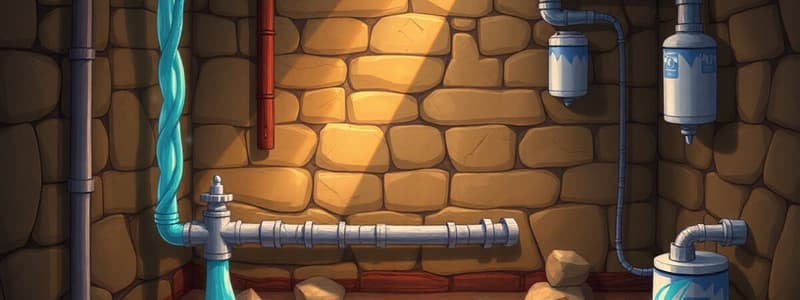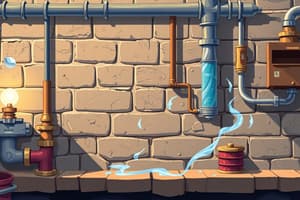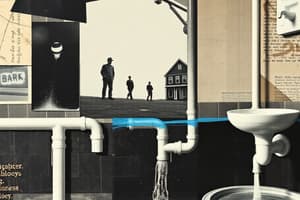Podcast
Questions and Answers
What is the primary definition of back siphonage?
What is the primary definition of back siphonage?
- The back flow of clean water into a plumbing fixture.
- The contamination of potable water by a physical connection.
- The discharge of water from a controlled outlet on a pipeline.
- The back flow of used contaminated water into a water supply pipe due to negative pressure. (correct)
Which term describes a closure for the end of a pipe?
Which term describes a closure for the end of a pipe?
- Branch Interval
- Calking
- Circuit Vent
- Blind Flange (correct)
What distinguishes a branch vent from a continuous vent?
What distinguishes a branch vent from a continuous vent?
- A branch vent connects one or more individual vents to a vent stack or stack vent. (correct)
- A branch vent connects to multiple fixtures while a continuous vent connects to a single drain.
- A branch vent can be horizontal while a continuous vent is always vertical.
- A branch vent discharges waste while a continuous vent does not.
What defines a combination waste and vent system?
What defines a combination waste and vent system?
What does a branch interval refer to?
What does a branch interval refer to?
What type of connection does a cross connection represent?
What type of connection does a cross connection represent?
Which fixture is synonymous with a faucet?
Which fixture is synonymous with a faucet?
What does calking involve?
What does calking involve?
What is the function of a dead end in plumbing systems?
What is the function of a dead end in plumbing systems?
Which statement correctly describes developed length?
Which statement correctly describes developed length?
What does the term 'fixture unit flow rate' refer to?
What does the term 'fixture unit flow rate' refer to?
What is the purpose of a flushometer valve?
What is the purpose of a flushometer valve?
What does 'effective opening' refer to in plumbing?
What does 'effective opening' refer to in plumbing?
Which component is responsible for maintaining the water level inside a tank?
Which component is responsible for maintaining the water level inside a tank?
How is the diameter of a pipe generally defined, except for brass and copper tubes?
How is the diameter of a pipe generally defined, except for brass and copper tubes?
What is a group vent in plumbing systems?
What is a group vent in plumbing systems?
What is the primary purpose of a vent stack in a drainage system?
What is the primary purpose of a vent stack in a drainage system?
What is the definition of a Horizontal Pipe?
What is the definition of a Horizontal Pipe?
What is the primary function of plumbing?
What is the primary function of plumbing?
Which statement accurately describes a vent system?
Which statement accurately describes a vent system?
Which of the following best describes a waste pipe?
Which of the following best describes a waste pipe?
What does the water supply system in a building include?
What does the water supply system in a building include?
Which statement accurately describes a Main Sewer?
Which statement accurately describes a Main Sewer?
What does the term 'Riser' refer to in plumbing?
What does the term 'Riser' refer to in plumbing?
What is the primary function of a Relief Vent?
What is the primary function of a Relief Vent?
What is the function of a wet vent?
What is the function of a wet vent?
What does the term 'Looped Vent' mean?
What does the term 'Looped Vent' mean?
What is included in a Plumbing System?
What is included in a Plumbing System?
What does Rough-In refer to in plumbing?
What does Rough-In refer to in plumbing?
What is a Local Vent Pipe?
What is a Local Vent Pipe?
What does the term
What does the term
Which ancient Roman word is the origin of the term 'Plumber'?
Which ancient Roman word is the origin of the term 'Plumber'?
What does the acronym DWV represent in drainage installation?
What does the acronym DWV represent in drainage installation?
What does an air gap in a water supply system refer to?
What does an air gap in a water supply system refer to?
What is the definition of 'back flow' in plumbing?
What is the definition of 'back flow' in plumbing?
Flashcards are hidden until you start studying
Study Notes
Plumbing Definition
- Plumbing is the art and science of installing pipes, fixtures, and other apparatus to convey and supply water in buildings.
- It also handles disposal and discharge of wastewater, gases, and substances outside buildings, ensuring health and sanitation.
Plumber
- A plumber is skilled in sanitation, derived from the Roman word "Plumbarius."
- "Plumbarius" referred to individuals working in the sanitary field in ancient Rome.
- "Plumbum" refers to lead, a metal used in Roman plumbing due to its malleability and resistance to acid.
Drainage System
- Waste is classified into Solid Waste (from water closets) and Liquid Waste (from fixtures).
- Two types of drainage pipes are Soil Pipes (for water closet waste) and Waste Pipes (for waste from other fixtures).
- Soil Pipes can accept both water closet and fixture waste.
- The Drainage Installation (DWV) stands for:
- D - Drainage of solid waste
- W - Waste from fixtures
- V - Ventilation of the piping system
Plumbing Terms
- Air Gap: An unobstructed vertical distance between a water supply source and a receptacle, preventing backflow.
- Backflow: The flow of water or substances from an unintended source into a potable water supply.
- Back Siphonage: The backflow of contaminated water from a fixture into a water supply pipe due to negative pressure.
- Battery of Fixture: A group of two or more similar fixtures discharging into a common horizontal waste pipe.
- Bib: Synonymous with faucet, cock, tap, plug, etc.
- Blind Flange: A flange closing a pipe end without an opening for water passage.
- Blow Off: A controlled outlet for water discharge from a pipeline.
- Branch: Any part of the piping system other than the main riser.
- Branch Interval: The length of a soil or waste stack between floor connections.
- Branch Vent: A vent connecting individual vents to a vent stack.
- Calking: Plugging an opening with materials like oakum or lead.
- Circuit Vent: A branch vent serving two or more traps, extending from the last fixture connection to the vent stack.
- Continuous Vent: A vertical vent that is a continuation of the drain to which it connects.
- Combination Fixture: A fixture combining a sink and tray or multiple compartment sinks in one vent.
- Combination Waste and Vent System: A system with horizontal wet venting for sinks or drains using a common waste and vent pipe.
- Common Vent: A drain from two or three fixtures connected to a single trap; also called a dual vent.
- Cross Connection: A physical connection between two separate piping systems, potentially allowing water flow between them.
- Dead End: An extended closed portion of a pipe where water or air can stagnate.
- Developed Length: The length along the center of a pipe and fitting.
- Diameter: The nominal internal diameter (ID) of a pipe, except for brass and copper, where it refers to the outside diameter (OD).
- Drainage System: Includes all piping within a property that conveys sewage, rainwater, or other liquid waste.
- Dry Vent: A vent that does not carry water or waste.
- Effective Opening: The minimum cross-sectional area at the point of water supply discharge, measured as a circle's diameter.
- Existing Work: Installed and approved plumbing prior to additions or alterations.
- Fixture Branch: A pipe connecting several fixtures.
- Fixture Drain: The drain from the trap of a fixture.
- Fixture Supply: A water supply pipe connecting a fixture to the fixture branch.
- Fixture Units: A quantity expressing the load on a plumbing system based on different fixture types.
- Fixture Unit Flow Rate: The total discharge flow in gallons per minute of a simple fixture divided by 7.5 gallons.
- Flood Level: A device inside a tank maintaining the water level.
- Ferrule: A metallic sleeve joined to a pipe opening, used for cleaning or examining the interior.
- Flush Valve: A device at the bottom of a tank for flushing water closets.
- Flushometer Valve: A device discharging a specific water quantity for flushing.
- Grade: The slope of a pipe, expressed as a fraction of an inch per foot.
- Group Vent: A branch vent serving two or more traps.
- Horizontal Pipe: Any pipe or fitting exceeding a 45-degree angle with vertical.
- Invert: The lowest portion of a non-vertical pipe or conduit.
- Liquid Waste: Discharge from fixtures or appliances without fecal matter.
- Local Vent Pipe: A pipe on the fixture side of a trap, removing vapor or foul air from a room.
- Looped Vent: Similar to a circuit vent but connects with a stack vent instead.
- Lateral: A secondary pipe in plumbing; a common sewer in sewage.
- Main: The principal artery of a continuous piping system.
- Main Sewer: A sewer line directly controlled by public authority.
- Main Vent: The principal artery of the venting system.
- Plumbing Fixtures: Installed receptacles, devices, or appliances supplied with water or discharging liquid or waste into a drainage system.
- Plumbing System: Includes water supply, distribution pipes, fixtures, traps, soil, waste, vent pipes, house drain, house sewer, and related connections.
- Relief Vent: A vent providing circulation of air between drainage and vent systems.
- Re-Vent Pipe: A vent connecting directly to a waste or group of wastes and extending to the main or branch vent pipe.
- Riser: A vertical water supply pipe carrying water to branches or fixtures.
- Rough-In: The installation of all parts of the plumbing system before fixture installation, including drainage, water supply, vent piping, and supports.
- Trap Seal: The maximum vertical depth of liquid retained by a trap.
- Vent Stack: A vertical pipe providing air circulation in the drainage system.
- Vent System: Pipes providing air flow within the plumbing system to protect trap seals.
- Vertical Pipe: A pipe installed vertically or at an angle less than 45 degrees with the vertical.
- Waste Pipe: A pipe conveying liquid waste free of fecal matter.
- Water Distributing Pipe: Conveys water from the water service pipe to fixtures and outlets.
- Water Service Pipe: The pipe connecting the water main or source to the building.
- Water Supply System: Includes the water service pipe, distributing pipes, connecting pipes, fittings, control valves, and appurtenances.
- Wet Vent: A vent receiving waste discharge from fixtures other than water closets.
Studying That Suits You
Use AI to generate personalized quizzes and flashcards to suit your learning preferences.




